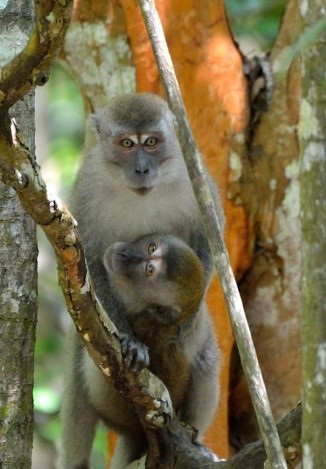Popular Reads
Top Results
Can't find what you're looking for?
View all search resultsPopular Reads
Top Results
Can't find what you're looking for?
View all search resultsLong-tailed monkeys on the edge
The use of wild-caught long-tailed macaques for biomedical research is troubling from an ethical perspective, but it is not supported by the international scientific community, either.
Change text size
Gift Premium Articles
to Anyone
I
ndonesia is extraordinarily rich in primates—more than 40 species of monkeys, apes and prosimians can be found on islands throughout the archipelago. Unfortunately, one of those species, the long-tailed macaques, have targets on their backs.
Long-tailed macaques are innovative and opportunistic; they thrive in the niches that humans create as we change the environment. However, their ecological and behavioral flexibility make them vulnerable in an unexpected way; their presence around villages and along the edges of forests makes them an easy target for traffickers who use horrific methods to trap them for sale to a handful of international pharmaceutical companies, with the demand for monkeys coming primarily from the United States, Japan, China and the European Union.
Long-tailed macaques are being rounded up in forests and urban areas and forcibly removed from their social and family groups in rough and violent ways—footage by Action for Primates shows them with their hands tied behind their backs, dropped into sacks, crammed into wooden crates, and even violently beaten—then shipped thousands of kilometers around the globe ostensibly to provide life-saving treatments and vaccines.
But macaques are not furry little humans with long tails; their immune systems and biology are very different from ours.
Despite decades of promises and hundreds of thousands of dead monkeys, experiments using monkeys have not resulted in effective vaccines for HIV, tuberculosis, malaria or any other dreaded human disease. In fact, an animal experimenter at the Washington National Primate Research Center admitted in a peer-reviewed journal that because of the complexity and limitations of the nonhuman primate models, “it remains difficult to extrapolate data from these models to inform the development of HIV vaccines”.
Similarly, COVID-19 experiments have shown the scientific community how irrelevant and often misleading monkey studies are—the most recent findings published in bioRxiv clearly state that macaques are not the ideal model when testing for SARS-CoV-2, the virus that causes COVID-19.
Long-tailed macaques are listed in Appendix II of the Convention on International Trade in Endangered Species of Wild Fauna and Flora (CITES). As a signatory to CITES, Indonesia has a responsibility to safeguard the conservation status of the species and to comply with its duties under CITES Article IV.
In 2020, the global conservation status of long-tailed macaques was raised to “vulnerable” following assessment by the International Union for Conservation of Nature’s Red List of Threatened Species, which acknowledged that wild populations of long-tailed macaques are succumbing to a variety of pressures, including capture for the international biomedical trade.
For the moment, Indonesia has postponed setting a 2022 quota for the capture and export of wild long-tailed macaques until population studies are carried out to determine the impact of the extensive “harvesting.”
Along with mounting evidence that the results of experiments on animals cannot be reliably applied to humans and the increasing development and implementation of technologies that can supplant animal use in laboratories, there is an increasing global concern about the ethics of animal experimentation.
The use of wild-caught long-tailed macaques for biomedical research is troubling from an ethical perspective, but it is not supported by the international scientific community, either.
Recently, the International Primatological Society issued a groundbreaking policy statement recommending that biomedical research facilities end their use of wild-caught primates and, more importantly, collaborate with advising authorities in “using and promoting alternative research strategies that do not involve capture of wild non-human primates, and thus engage as active players in primate conservation”.
Moving away from unreliable and unethical tests on animals and instead investing in superior, non-animal methods will be better for humans, other animals, and the future of science. The People for the Ethical Treatment of Animals (PETA) hopes that the Indonesian scientific community will initiate the move away from animal testing and immediately halt the capture of wild long-tailed macaques for export and/or use in biomedical research.
***
The writer is a senior science advisor on primate experimentation at the People for the Ethical Treatment of Animals (PETA).










